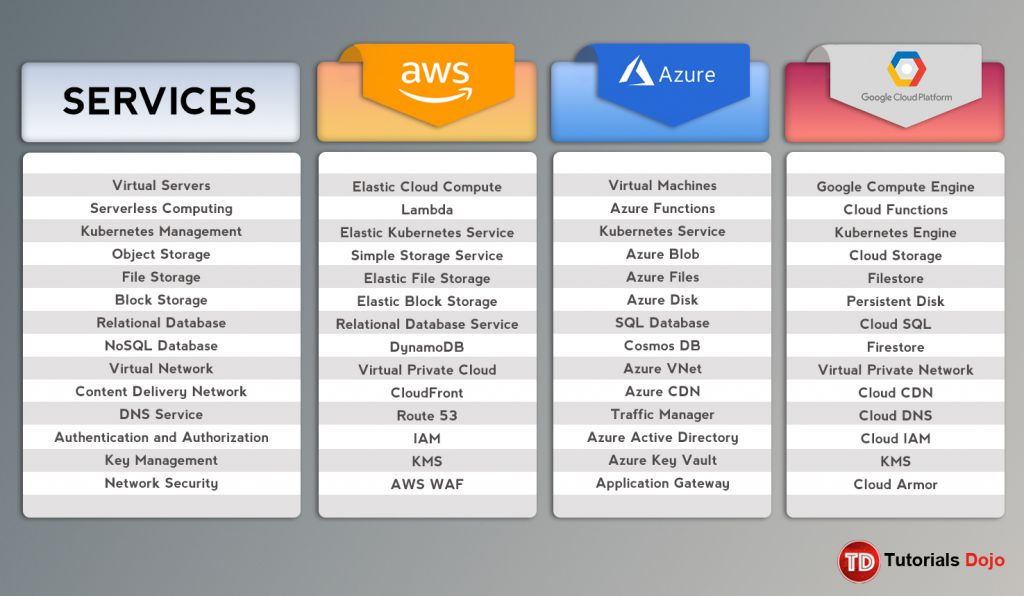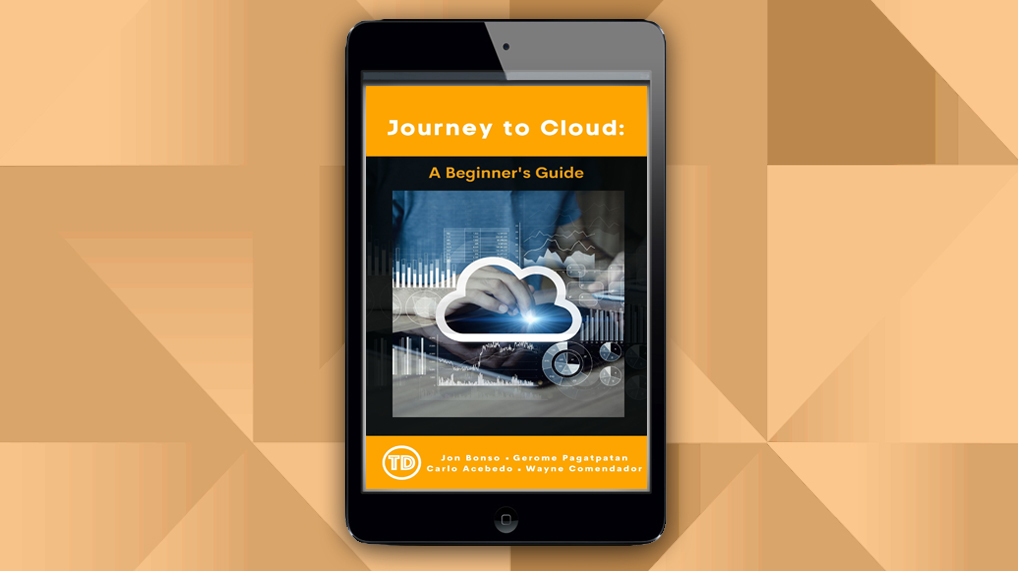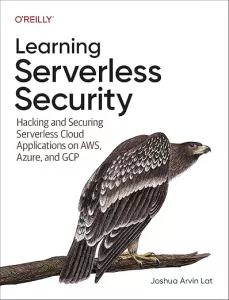Last updated on July 13, 2023
In the previous section, we outlined the different certifications paths for AWS, Azure, and Google Cloud. In this post, we’ll compare these top three cloud service providers and share the advantages of learning these technologies.
Selecting a cloud platform to learn depends on several factors, like your current skills, demands in the job market, and even personal preferences. Remember, there’s no hard and fast rule dictating which one to learn first. Most of these platforms are designed to tackle the same challenges, just in their unique ways. This article will look at the key takeaways from the big three leaders in cloud computing, and we’ll analyze them for you. At the end of the article, we will share our thoughts and give you bits of advice to help you decide which cloud platform to learn and which can give you an edge in the competitive job market today.
Amazon Web Services (AWS)
AWS is the oldest and most widely used cloud platform globally, boasting over a decade of experience. It offers a wide array of services designed to cater to various user needs. With its longevity and extensive range of mature technologies, AWS holds the world’s largest public cloud market share, making it the leading innovator in cloud solutions.
- Pros
- A leading cloud innovator offering mature and feature-rich technologies
- Has a broad global presence with a vast network of data centers
- Offers comprehensive documentation and extensive training materials
- Good customer support
- Cons
- Its complex billing system can sometimes be difficult to navigate
- Given its extensive range of services, it can have a steep learning curve
- Notable Companies that use AWS
- Netflix
- Airbnb
- Spotify
- Why learn AWS?
- AWS Certifications are in high demand, often reflecting positively on job prospects
- AWS offers a wealth of learning resources, making it a great starting point for those new to cloud technologies
Microsoft Azure
Azure is the second-largest Cloud Service Provider, offering excellent support for interoperability with data centers, especially when integrated with Microsoft’s software suite. This makes Azure’s hybrid cloud solutions a standout feature.
- Pros
- Offers a familiar environment for users already invested in the Microsoft ecosystem
- Seamless integration with Microsoft products
- Strong support for hybrid cloud solutions
- Cons
- Documentation is not as good as that of AWS
- Customer support quality has been reported as inconsistent.
- Notable companies that use Azure
- eBay
- Boeing
- Samsung
- Why learn Azure?
- Familiarity with Microsoft’s ecosystem makes transitioning to Azure easier, especially if you hold Microsoft Certifications like MCSA: Windows Server 2016, MCSA: Office 365, MCSA: Windows 10
- Azure’s strong support for hybrid solutions can be a valuable skill as more businesses adopt a hybrid cloud strategy.
Google Cloud Platform (GCP)
Notably, among the three cloud platforms, GCP stands out for its competitive pricing model and flexible cost-control options, letting you experiment with various services and features without breaking the bank. Think about this: it is estimated that 1.17 billion people use Google Search. The way Google smoothly manages this colossal traffic is nothing short of impressive. One of the main benefits of running your applications in GCP is that you’ll get access to the same resources and tools that power Google.
- Pros
- Offers live migration of Virtual Machines
- Competitive pricing model
- Provides a broad toolset for Artificial Intelligence and Machine Learning
- Seamless integration with Google’s suite of technologies (Google APIs, Kubernetes)
- Cons
- Although improving, GCP’s product range and feature set may not be as extensive or mature as AWS or Azure.
- While GCP is growing, its global footprint and market presence are smaller compared to AWS and Azure.
- Notable companies that use GCP
- Coca-Cola
- Snapchat
- Ubisoft
- Why learn GCP?
- The Google Certified Professional Cloud Architect certification is currently one of the highest paying in the IT industry.
- If you regularly use Google’s services (Firebase, Google Maps API), understanding GCP could greatly enhance your development capabilities.
- GCP’s strong integration with popular open-source technologies like Kubernetes makes it a valuable skill in a modern, cloud-based development environment.
Below is a visual representation of the core services for AWS, Azure, and GCP. You can use this as a reference when studying or working on a specific cloud platform to easily differentiate their respective service counterparts:
Summary
If you’re fresh out of college or a newbie with no background whatsoever in cloud computing, we recommend learning AWS. With AWS being the most prevalent cloud platform, there are abundant resources and tutorials available online to guide you. Additionally, since AWS is the most widely adopted cloud platform, it’s not difficult to find online communities and groups that could answer your questions when encountering problems that you don’t understand while doing hands-on exercises.
When it comes to entry-level positions in cloud-related roles, familiarity with AWS could give you a competitive edge. Many job openings specifically seek AWS expertise, placing you in a good position if you’ve honed your skills on this platform. However, if your interests lie in specialized fields like Big Data and Machine Learning, you might want to consider GCP. Moreover, if you’re aiming to join a company predominantly using Microsoft Services, getting acquainted with Azure might be necessary.
In terms of job market demand, AWS and Azure tend to hold the advantage. But remember, high demand often leads to high competition. Conversely, GCP, being less popular, sees fewer job postings, leading to less competition for each open role. But don’t be misled; companies won’t hire purely out of desperation. The required competence to perform the job remains paramount. Thus, if you have the resources to learn and master GCP skills, you could find a smoother path in your job hunt.
No matter which cloud platform you decide to dive into first, getting a solid grip on the core ideas of cloud computing is key. After all, these principles stay pretty much the same no matter what cloud provider you’re working with. So don’t sweat it – your efforts aren’t going to be wasted. Whether you choose AWS, Azure, or GCP, you’re picking up skills and knowledge that’ll come in handy even if you decide to switch lanes later. Essentially, you’re building a versatile skill set that’ll keep you nimble and adaptable in this fast-paced, ever-changing cloud landscape. So go ahead, take the plunge, and start your cloud journey. You’ve got this!
On the next article, we will talk about one of the commonly asked questions of those who are new to cloud computing: Are Cloud Certifications Enough to Land Me a Job?
This article is part of our free Journey to Cloud: A Beginner’s Guide eBook. Click here to get a free copy.
Ready to take your learning to the next level? Become a multi-cloud professional by being skilled in AWS, Azure, and Google Cloud Platform. Check out our list of FREE resources here:




















